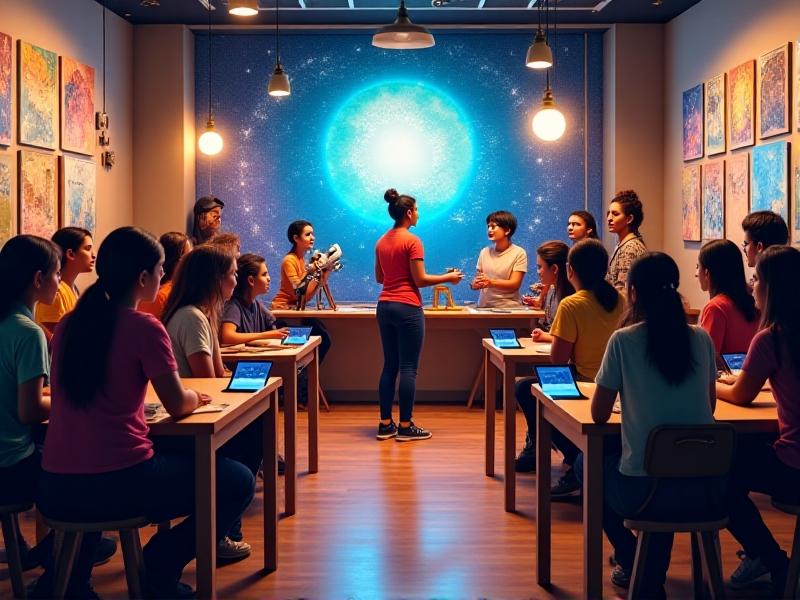Mobile Observatory Units for Rural Accessibility Initiatives
Introduction to Mobile Observatory Units
Mobile Observatory Units (MOUs) are innovative solutions designed to bring astronomical education and accessibility to rural areas. These units are equipped with state-of-the-art telescopes, interactive displays, and educational materials, all housed within a mobile vehicle. The primary goal of MOUs is to bridge the gap between urban and rural communities in terms of access to scientific knowledge and resources. By traveling to remote locations, MOUs provide hands-on learning experiences that inspire curiosity and foster a deeper understanding of the universe.

The Need for Rural Accessibility Initiatives
Rural areas often face significant challenges in accessing educational and scientific resources. Geographic isolation, limited infrastructure, and financial constraints can hinder the ability of rural communities to engage with modern advancements. MOUs address these issues by bringing the observatory directly to the people. This initiative not only democratizes access to astronomy but also encourages STEM education among young learners. By making science tangible and exciting, MOUs have the potential to ignite lifelong passions and career aspirations in fields that might otherwise seem out of reach.

Design and Features of Mobile Observatory Units
The design of MOUs is both functional and engaging. Each unit is equipped with high-quality telescopes capable of capturing detailed images of celestial bodies. Interactive touchscreens provide information about the night sky, while augmented reality features allow users to visualize constellations and planetary movements. The units are also designed to be energy-efficient, often powered by solar panels, making them sustainable and adaptable to various environments. The interior is climate-controlled to ensure comfort during all seasons, and the exterior is built to withstand diverse weather conditions, ensuring reliability in remote locations.

Educational Impact on Rural Communities
The educational impact of MOUs on rural communities is profound. These units provide a platform for hands-on learning, enabling students to engage directly with scientific concepts. Teachers can use MOUs to supplement their curriculum, offering real-world applications of theoretical knowledge. Additionally, MOUs often host workshops and seminars led by professional astronomers, providing unique opportunities for mentorship and inspiration. By fostering a culture of curiosity and discovery, MOUs help to cultivate a new generation of thinkers and innovators who are equipped to tackle the challenges of the future.
Challenges and Solutions in Implementation
Implementing MOUs in rural areas comes with its own set of challenges. Logistical issues such as transportation, maintenance, and funding can pose significant obstacles. However, these challenges can be mitigated through strategic partnerships with educational institutions, government agencies, and private sponsors. Crowdfunding campaigns and community involvement can also play a crucial role in sustaining these initiatives. Additionally, training local volunteers to operate and maintain the units ensures long-term viability and fosters a sense of ownership within the community. By addressing these challenges head-on, MOUs can continue to thrive and expand their reach.
Future Prospects and Expansion
The future of MOUs is bright, with potential for expansion into new regions and communities. Advances in technology will continue to enhance the capabilities of these units, making them even more effective and accessible. Partnerships with international organizations can facilitate global outreach, bringing the wonders of the universe to underserved populations worldwide. Furthermore, the integration of virtual reality and other immersive technologies could revolutionize the way people experience astronomy, making it more interactive and engaging than ever before. As MOUs evolve, they will undoubtedly play a pivotal role in shaping the future of science education and accessibility.
Conclusion: The Transformative Power of MOUs
Mobile Observatory Units represent a transformative approach to science education and rural accessibility. By breaking down barriers and bringing the universe closer to home, MOUs inspire wonder, curiosity, and a deeper appreciation for the cosmos. These units not only provide educational opportunities but also foster a sense of community and shared discovery. As we look to the future, the continued development and expansion of MOUs will undoubtedly have a lasting impact on the way we understand and engage with the world around us. Through innovation, collaboration, and a commitment to accessibility, MOUs are paving the way for a brighter, more inclusive future.








